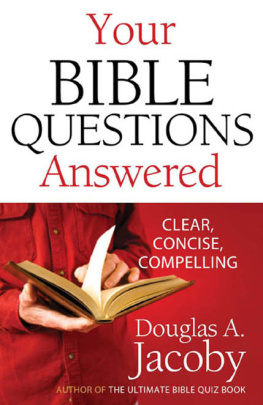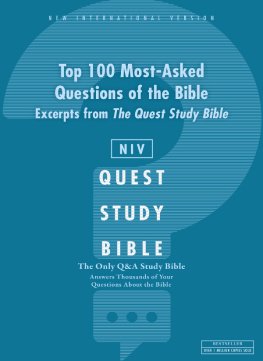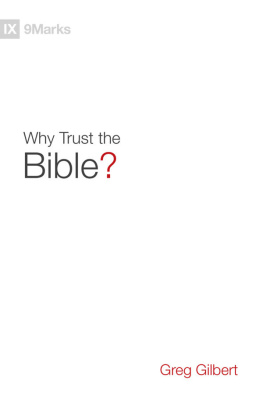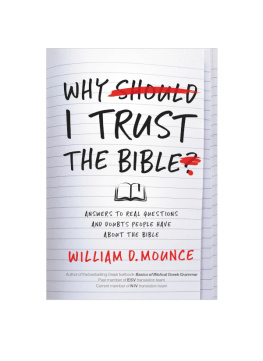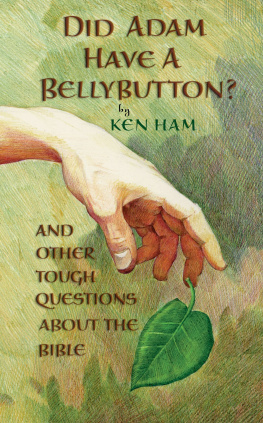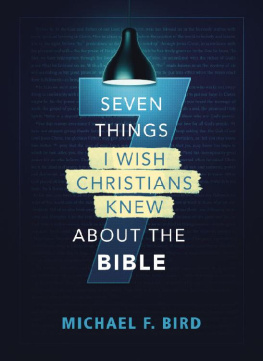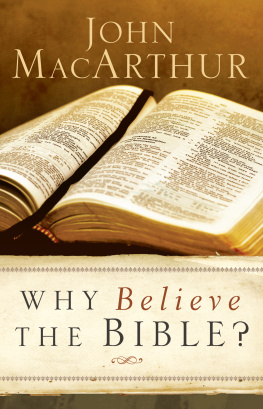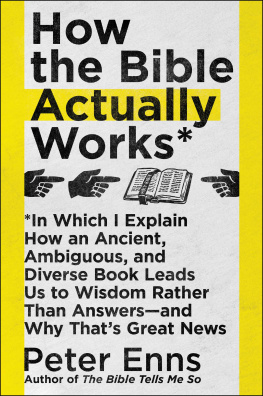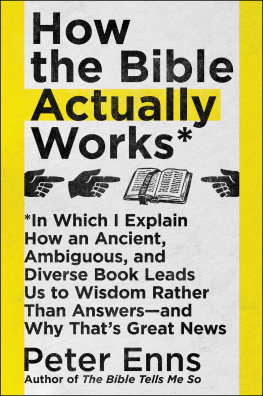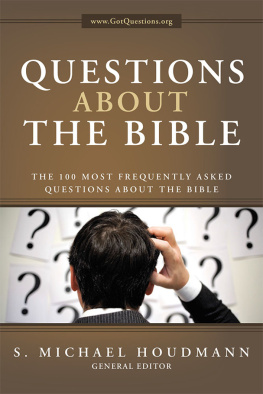
Your
BIBLE
QUESTIONS
Answered
Douglas A.
Jacoby

HARVEST HOUSE PUBLISHERS
EUGENE, OREGON
Unless otherwise indicated all Scripture quotations are from the Holy Bible, New International Version, NIV. Copyright 1973, 1978, 1984 by Biblica, Inc. Used by permission of Zondervan. All rights reserved worldwide.
Verses marked NASB are from the New American Standard Bible, 1960, 1962, 1963, 1968, 1971, 1972, 1973, 1975, 1977, 1995 by The Lockman Foundation. Used by permission. (www.Lockman.org)
Verses marked HCSB are from the Holman Christian Standard Bible, Copyright 1999, 2000, 2002, 2003 by Holman Bible Publishers. Used by permission. Holman Christian Standard Bible, Holman CSB, and HCSB are federally registered trademarks of Holman Bible Publishers.
Verses marked KJV are from the King James Version of the Bible.
Cover photo iStockphoto / fstop123
Cover by Dugan Design Group, Bloomington, Minnesota
YOUR BIBLE QUESTIONS ANSWERED
Copyright 2011 by Douglas A. Jacoby
Published by Harvest House Publishers
Eugene, Oregon 97402
www.harvesthousepublishers.com
Library of Congress Cataloging-in-Publication Data
Jacoby, Douglas A., 1959-
Your Bible questions answered / Douglas Jacoby.
p. cm.
Includes index.
ISBN 978-0-7369-3074-1 (pbk.)
ISBN 978-0-7369-4122-8 (eBook)
1. BibleExaminations, questions, etc. I. Title.
BS612.J33 2011
220.6'1dc22
2010052596
All rights reserved. No part of this publication may be reproduced, stored in a retrieval system, or transmitted in any form or by any meanselectronic, mechanical, digital, photocopy, recording, or any otherexcept for brief quotations in printed reviews, without the prior permission of the publisher.
Printed in the United States of America
11 12 13 14 15 16 17 18 19 / LB-NI / 10 9 8 7 6 5 4 3 2 1
Contents
W e are born inquisitive. God made us that way. At a young age we begin asking questions. As we mature, we grapple with issues and try to remain intellectually honest, especially in the absence of definitive answers. We are all tempted to jump at the ready answer. Certainty is comforting, but must be rooted in truth. Honesty may entail suspending judgment or admitting, I dont know.
The questions in this book have been submitted by real people, seekers in Africa, Asia, the South Pacific, the Middle East, Europe, and the Americas. They asked, and I did my best to answer by telephone, e-mail, private appointment, and especially the Q&A sessions that follow my presentations worldwide. You may not always agree with my responsesI often even disagree with myself, changing my mind on various subjects as I mull over new information and other peoples perspectivesbut I am grateful that you are giving me an audience.
Of course well never have all the answers, and fortunately salvation isnt based on sophistication. The secret things belong to the Lord our God, but the things revealed belong to us and to our children forever, that we may follow all the words of this law (Deuteronomy 29:29). The search for truth must continue, for this is Gods will (Matthew 7:7). Many of our discoveries enrich our faith, supply what is missing in the big picture, and equip us to help others who may be stuck in their own quest.
A crucial challenge in interpreting Scripture is determining whether the author was writing metaphorically or literally. In some cases, this is obvious. For example, if David found rest in the shadow of Gods wings (Psalm 17:8), are we to believe God is a bird? Of course not. Or take Jeremiah 51:42-43, where the image of drought is superimposed on the image of flood. A literal meaning is obviously not intended. But the decision isnt always so easy. Are the days of creation in Genesis 1 literal 24-hour days? How many of the vibrant symbols in the book of Revelation are intended to be understood literally? In such cases, we do well to focus on the main point of the passage and not to be distracted by speculative positions.
The point of the search is not to be smarter or biblically savvier than everybody else. I remember a news item about a Bible-quoting contest that ended in murder. The loser was so incensed that he went home, grabbed a gun, and shot his opponent in the face. For many, it is unthinkable that they have got it wrong. Yet if were mistaken, we need to admit it; if we gain new knowledge, we need to be thankful and humble. As the apostle Paul asked the Corinthians, Who makes you different from anyone else? What do you have that you did not receive? And if you did receive it, why do you boast as though you did not? (1 Corinthians 4:7).
As with individuals, so with churches. A fully biblical congregation wont say, Dont ask, just believe! or Weve always done it this way; why question it? Ultimately, if the Bible is the authority, then the church is not, for the word of God trumps the word of man (1 Thessalonians 2:13). Groups are as unlikely to arrive as individuals are.
With this spirit of humility in mind, Your Bible Questions Answered makes a stab at a smattering of Bible questions that can be answered. To get the most out of this book, be sure to read the Scriptures cited in the questions. The answers assume you are familiar with them. Also, keep in mind that this volume is illustrative, not comprehensive. Some of the selections arise naturally from intriguing topics. Others are suggested by apparent contradictions or difficult passages. None of these, however, disproves or discredits the fundamental message of Scripture. At the end of the day, there are more answers than we have questions, for God has the answer to any and every question we could possibly put to him.
Douglas Jacoby
Marietta, Georgia
January 2011

Where did the title Holy Bible come from, and what does it mean?
The word Bible does not appear anywhere in Scripture. Its source is the Greek word biblion, book, as in bibliography. As millions of people can testify from personal experience, the Bible is a library of 66 life-giving volumes.
The Bible is holy because it possesses a spiritually pure quality, not because we are to worship it. I like the acronym Basic Instructions Before Leaving Earth. Yet the purpose of this book is not just to relay information, but to bring about transformation. It is also holy because it connects us with the spiritual world, helping us to know God, as those willing to let the message penetrate soon find out.
What is Scripture?
Scripture is written communication from God to us, the word of God. This includes the sacred writings of the Old and New Testaments.
What is the layout of the Bible?
The books of the Old Testament are arranged in three sections in the Hebrew Bible: the Law, the Prophets, and the Writings. The books in Christian Bibles are the same, but the order is somewhat different. Malachi is the final book, though in Hebrew manuscripts, 12 Chronicles closes the canon.
In the Hebrew Bible, the Law is the first five books of our Old Testament. The Prophets include the former prophets (Joshua, Judges, Samuel, Kings) and the latter prophets (Isaiah, Jeremiah, Ezekiel, and the 12 minor prophets). The Writings consist of Psalms, Proverbs, Job, Song of Solomon, Ruth, Lamentations, Esther, Ecclesiastes, Daniel, EzraNehemiah, and Chronicles.
Next page
